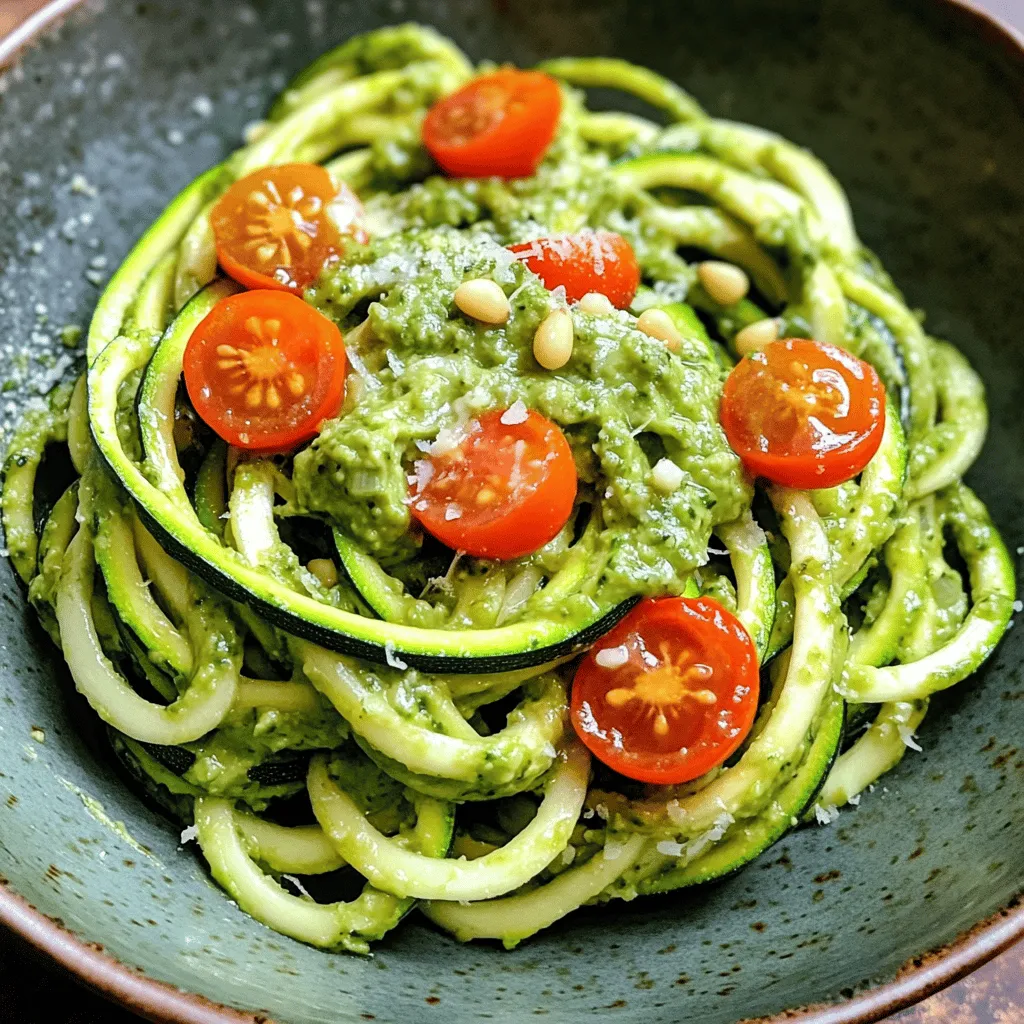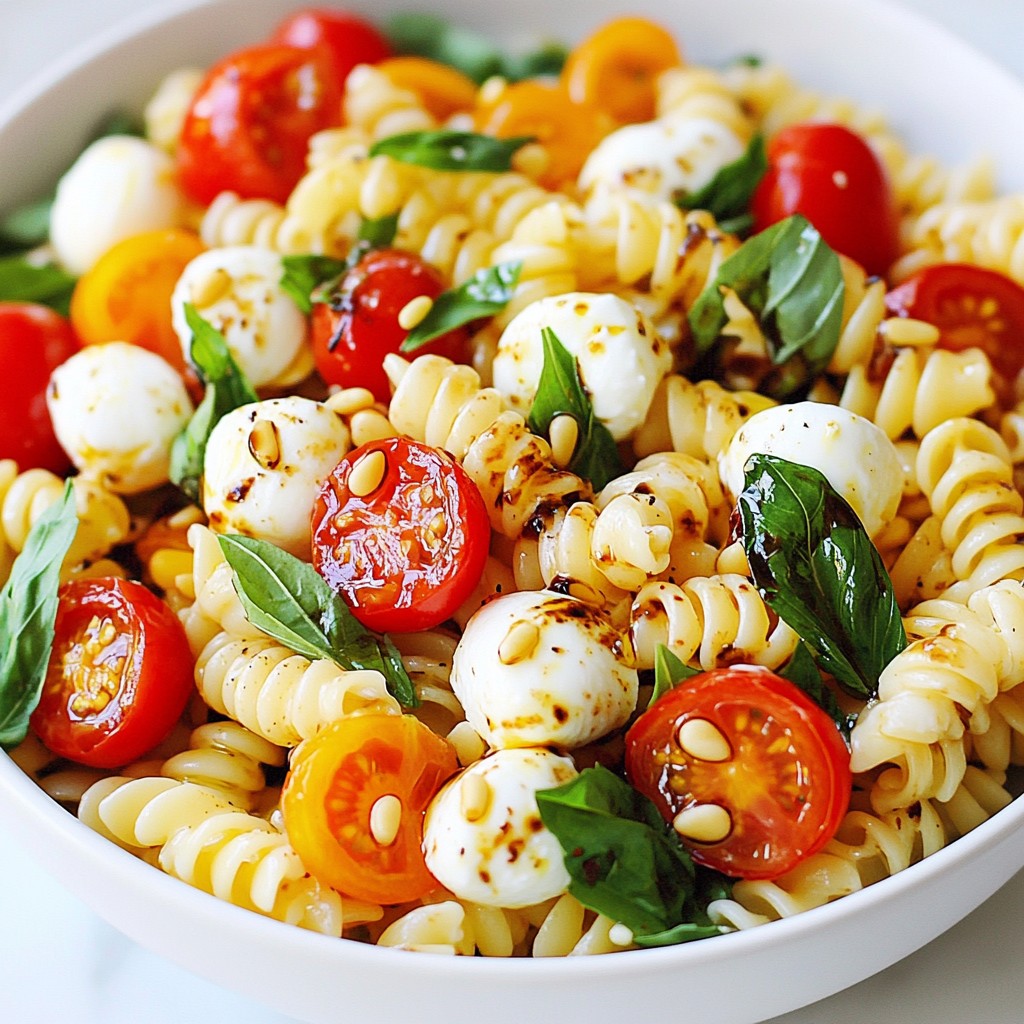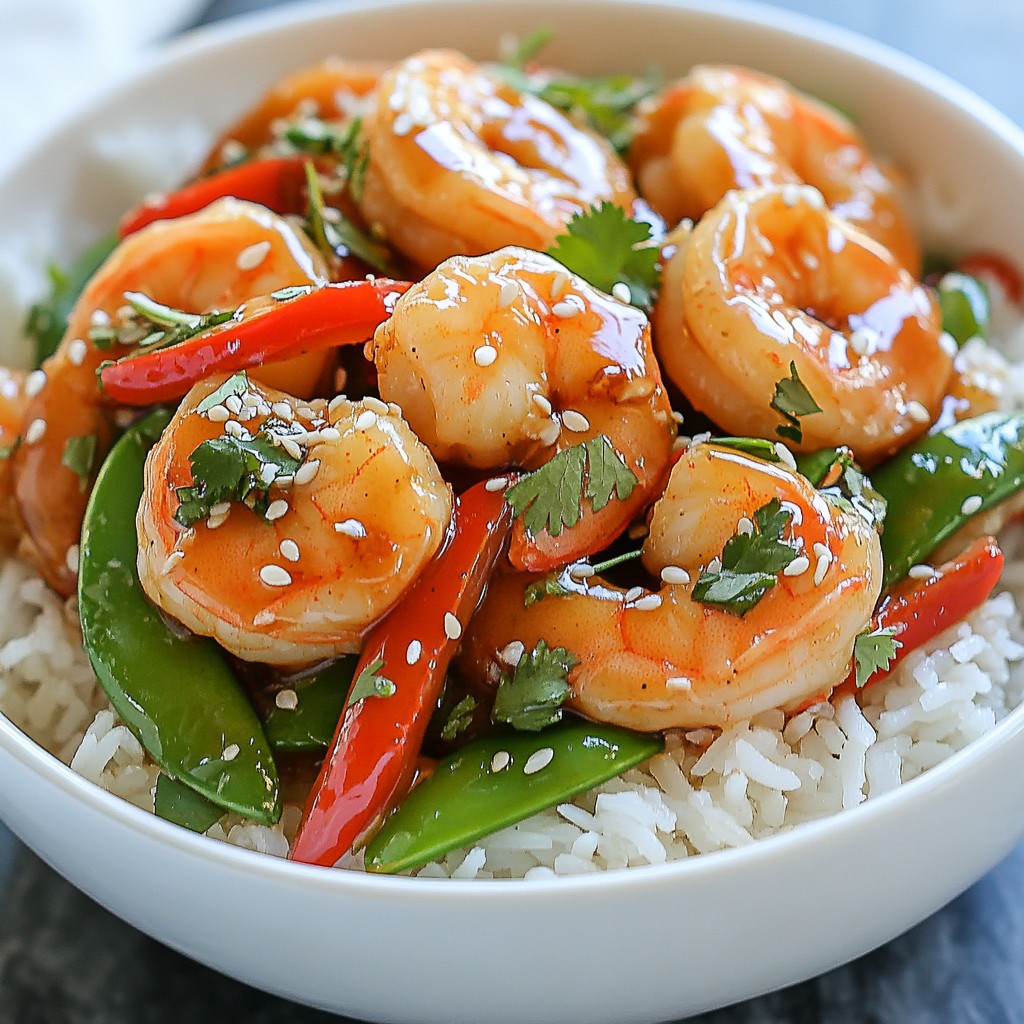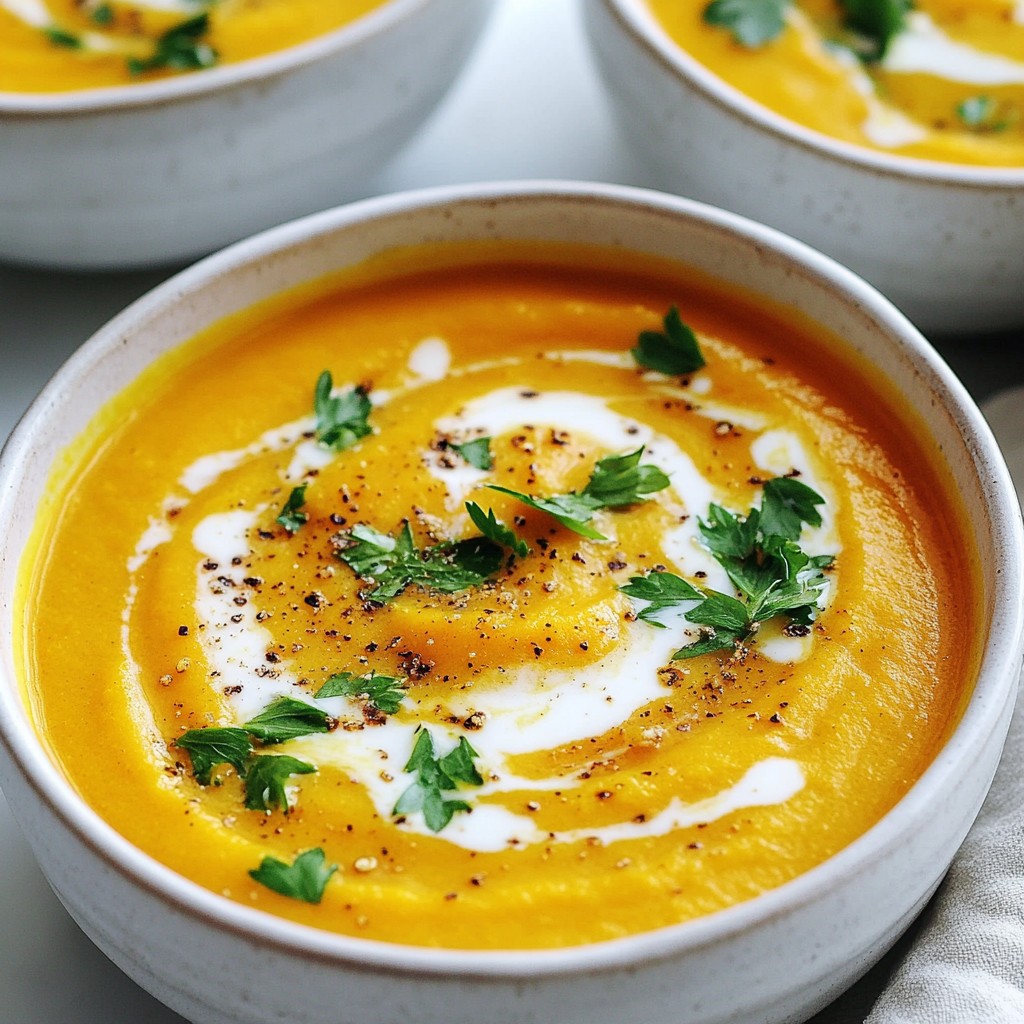Are you ready to enjoy a fresh and tasty meal? Zucchini noodles with pesto are not only easy to make but also packed with flavor. In this guide, I’ll share simple steps to create this vibrant dish, using both fresh and pantry staples. Whether you’re looking for healthy recipes or just want to impress at dinner, this savory delight will satisfy your cravings. Let’s dive in and make something delicious!
Ingredients
List of Ingredients for Zucchini Noodles with Pesto
– 4 medium zucchinis, spiralized
– 1 ripe avocado
– 1 cup fresh basil leaves
– 2 cloves garlic, minced
– 1/4 cup pine nuts (or walnuts)
– 2 tablespoons lemon juice
– 3 tablespoons olive oil
– Salt and pepper to taste
– Cherry tomatoes, halved (for garnish)
– Grated Parmesan cheese (optional, for serving)
Fresh vs. Dried Ingredients: What to Use
Fresh ingredients pack more flavor. I always prefer fresh basil for pesto. It gives a bright taste. Use ripe avocados, as they blend smooth and creamy. Garlic should be fresh for the best kick. If you use dried herbs, the taste changes. Dried basil may work, but fresh is best.
Alternative Ingredients for Dietary Preferences
If you want to make this dish vegan, skip the Parmesan cheese. You can add nutritional yeast for a cheesy flavor. For nut allergies, use sunflower seeds instead of pine nuts or walnuts. If you want a gluten-free meal, this recipe is perfect since zucchini noodles are naturally gluten-free.
Step-by-Step Instructions
Preparing Zucchini Noodles: Spiralizing Techniques
To start, you need to make zucchini noodles. Use a spiralizer for the best results. Simply place the zucchini in the spiralizer and twist it to create long noodles. Each zucchini will give you a nice amount. If you don’t have a spiralizer, a vegetable peeler works too. Just peel long strips to mimic noodles. After spiralizing, set the noodles aside. They will be ready to toss with the pesto.
Making the Avocado Pesto: Blending Tips
Next, let’s make the avocado pesto. Grab a food processor and add the ripe avocado. Then, toss in the fresh basil leaves. You also need to add the minced garlic and pine nuts. Squeeze in the lemon juice for brightness, and pour in olive oil. Blend everything until it’s smooth and creamy. If the mixture is too thick, add a splash of water or extra oil. This will help it blend better. Taste it! Add salt and pepper to your liking.
Combining Ingredients: Mixing Noodles and Pesto
Now, it’s time to combine the noodles and pesto. In a large bowl, add your zucchini noodles and pour the avocado pesto on top. Toss them gently to coat all the noodles with the pesto. Make sure every strand gets a good amount of sauce. If you want warm noodles, lightly sauté them in a pan for a few minutes. This step adds a nice touch but is optional. Finally, serve the noodles with halved cherry tomatoes and, if you like, sprinkle some grated Parmesan on top for added flavor.Enjoy your fresh and savory meal!
Tips & Tricks
Perfecting the Texture of Zucchini Noodles
To get the best texture for your zucchini noodles, start with firm zucchinis. Look for ones that are smooth and heavy. Spiralize them just before cooking to keep them fresh. If you want a firmer noodle, do not sauté them for long. Two to three minutes will keep them crisp. If you prefer softer noodles, you can sauté them a bit longer, but be careful not to overcook.
Enhancing Flavor in Avocado Pesto
Fresh ingredients make a big difference in flavor. Use ripe avocados for a creamy pesto. Fresh basil adds a bright taste. Garlic gives it a nice kick. For a nutty flavor, try using toasted pine nuts or walnuts. Adding lemon juice helps balance the richness of the avocado. If you want a bit more zest, include a pinch of red pepper flakes for heat.
Serving Suggestions for a Beautiful Presentation
Presentation matters when serving your dish. Use a shallow bowl for your noodles. Arrange them into a nest shape for a fun look. Scatter halved cherry tomatoes on top for color. If you want to add a touch of luxury, sprinkle grated Parmesan cheese over the dish. Drizzle a little olive oil around the plate for a professional finish. This makes your meal not just tasty but also beautiful.
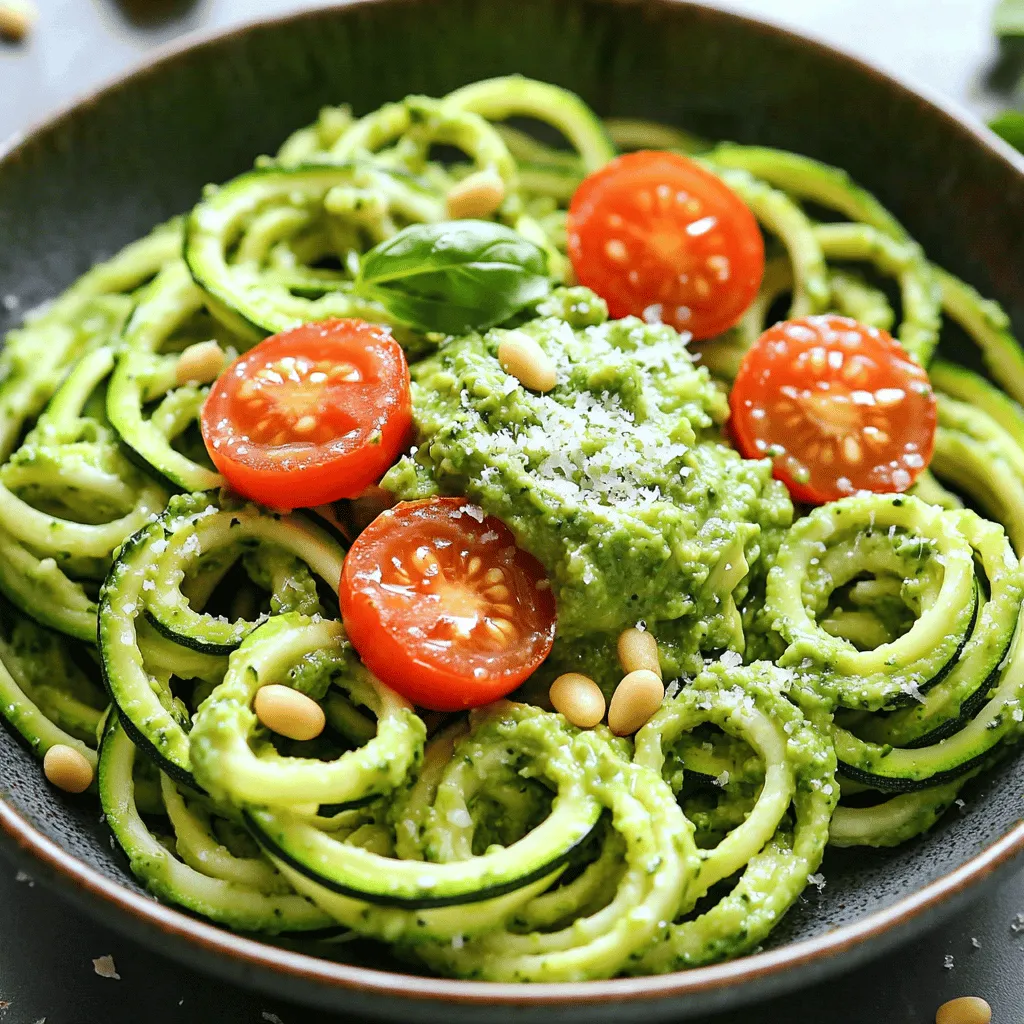
Variations
Additional Ingredients to Customize Your Dish
You can enhance your zucchini noodles with more flavors. Try adding cooked chicken or shrimp for protein. You can also mix in sautéed bell peppers or spinach for color and nutrition. If you love heat, a pinch of red pepper flakes adds a nice kick. For a touch of sweetness, consider sun-dried tomatoes or roasted red peppers. These additions will make your dish even more exciting.
Different Nut Options for Pesto
While pine nuts are classic for pesto, you can switch it up with other nuts. Walnuts bring a richer taste, while almonds add a nice crunch. Pecans can give a buttery flavor, and cashews create a creamy texture. Each nut option brings its own twist, making your pesto unique and delicious. Feel free to explore what you like best.
Vegan and Gluten-Free Modifications
This recipe is easy to adapt for different diets. To make it vegan, skip the Parmesan cheese or use a plant-based alternative. You can also add nutritional yeast for a cheesy flavor without dairy. For gluten-free needs, rest assured that zucchini noodles are naturally gluten-free. Make sure all your added ingredients, like sauces or condiments, are also gluten-free. This way, everyone can enjoy this fresh meal.
Storage Info
How to Store Leftover Zucchini Noodles
To store leftover zucchini noodles, place them in an airtight container. This keeps them fresh for up to two days. You can also layer paper towels between the noodles to absorb excess moisture. This helps prevent sogginess.
Storing Avocado Pesto for Freshness
Avocado pesto can brown quickly. To store it, press plastic wrap directly onto the surface. This minimizes air contact. You can also add a thin layer of olive oil on top. Store it in an airtight container in the fridge for up to three days.
Reheating Tips for Best Results
When reheating zucchini noodles, do it gently to avoid mushiness. Use a pan over low heat. Add a splash of water or olive oil to keep them moist. Stir frequently for about two to three minutes. This method warms them without losing texture.
FAQs
Can I make zucchini noodles without a spiralizer?
Yes, you can make zucchini noodles without a spiralizer. Use a vegetable peeler to create long, thin strips. This method works great and gives you a similar texture. You can also use a box grater, but it will make shorter pieces. Both methods are quick and easy.
How do I keep zucchini noodles from getting soggy?
To keep zucchini noodles from getting soggy, you should salt them first. Sprinkle salt on the noodles and let them sit for about 10 minutes. This step helps draw out excess water. After that, pat them dry with a paper towel. Cooking them briefly, just until they are tender, can also help. Avoid overcooking.
What are the nutritional benefits of zucchini noodles?
Zucchini noodles are low in calories and high in nutrients. They are rich in vitamins A and C. They also provide fiber, which is good for digestion. One cup of zucchini noodles has about 20 calories and 4 grams of carbs. They are a great alternative to traditional pasta.
Can I make this dish ahead of time?
Yes, you can make this dish ahead of time, but store the components separately. Keep the zucchini noodles and pesto in different containers in the fridge. This way, they stay fresh. Combine them just before serving to maintain the best texture and flavor.
Zucchini noodles with pesto offer a fresh, tasty dish you can customize. We discussed ingredients, preparation steps, and helpful tips for perfect texture and flavor. Remember, you can swap ingredients based on your diet. Store leftovers well to maintain freshness. In summary, this dish is versatile and easy to make. Try it today for a healthy meal that impresses!
